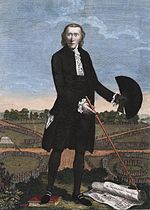
Lord George Gordon
British politician (1752-1793)
King of Great Britain and Ireland from 1760 to 1820
George III was the King of Great Britain and Ireland from 1760 until his death in 1820. He was the first British monarch to be born in Great Britain and speak English as his first language. Despite some mental health issues later in his life, George III had a long and eventful reign, marked by military conflicts, the loss of the American colonies, and the banning of the transatlantic slave trade.
Table of Contents
Princess Augusta of Great Britain
Prince Edward, Duke of York and Albany
Princess Elizabeth of Great Britain
Prince William Henry, Duke of Gloucester and Edinburgh
Prince Henry, Duke of Cumberland and Strathearn
Princess Louisa of Great Britain
Prince Frederick of Great Britain
Caroline Matilda of Great Britain
Charlotte of Mecklenburg-Strelitz
Hannah Lightfoot
George IV of the United Kingdom
Prince Frederick, Duke of York and Albany
William IV
Charlotte, Princess Royal
Prince Edward, Duke of Kent and Strathearn
Princess Augusta Sophia of the United Kingdom
Princess Elizabeth of the United Kingdom
Ernst August II of Hanover
Prince Augustus Frederick, Duke of Sussex
Prince Adolphus, Duke of Cambridge
Princess Mary of the United Kingdom
Princess Sophia of the United Kingdom
Prince Octavius of Great Britain
Prince Alfred of Great Britain
Princess Amelia of the United Kingdom
George IIIwas King of Great Britain and Ireland from 25 October 1760 until his death in 1820. The Acts of Union 1800 unified Great Britain and Ireland into the United Kingdom of Great Britain and Ireland, with George as its king. He was concurrently Duke and Prince-elector of Hanover in the Holy Roman Empire before becoming King of Hanover on 12 October 1814. He was a monarch of the House of Hanover, who, unlike his two predecessors, was born in Great Britain, spoke English as his first language, and never visited Hanover.
George was born during the reign of his paternal grandfather, King George II, as the first son of Frederick, Prince of Wales, and Princess Augusta of Saxe-Gotha. Following his father’s death in 1751, Prince George became heir apparent and Prince of Wales. He succeeded to the throne on George II’s death in 1760. The following year, he married Princess Charlotte of Mecklenburg-Strelitz, with whom he had 15 children. George III’s life and reign were marked by a series of military conflicts involving his kingdoms, much of the rest of Europe, and places farther afield in Africa, the Americas and Asia. Early in his reign, Great Britain defeated France in the Seven Years’ War, becoming the dominant European power in North America and India. However, Britain lost 13 of its North American colonies in the American War of Independence. Further wars against revolutionary and Napoleonic France from 1793 concluded in the defeat of Napoleon at the Battle of Waterloo in 1815. In 1807, the transatlantic slave trade was banned from the British Empire.
In the later part of his life, George had recurrent and eventually permanent mental illness. The exact nature of the mental illness is not known definitively, but historians and medical experts have suggested that his symptoms and behaviour traits were consistent with either bipolar disorder or porphyria. In 1810, George suffered a final relapse, and his eldest son, the Prince of Wales, was named Prince Regent the following year. The King died aged 81, at which time the Regent succeeded him as George IV. George III reigned during much of the Georgian and Regency eras. At the time of his death, he was the longest-lived and longest-reigning British monarch, having reigned for 59 years and 96 days; he remains the longest-lived and longest-reigning male monarch in British history.
George III became King of Great Britain and Ireland on 25 October 1760 and reigned until his death in 1820.
The Acts of Union 1800 unified Great Britain and Ireland into the United Kingdom of Great Britain and Ireland, with George III as its king.
Yes, unlike his two predecessors, George III was born in Great Britain, spoke English as his first language, and never visited Hanover.
George III reigned for 59 years and 96 days, making him the longest-lived and longest-reigning British monarch at the time of his death.
George III’s reign was marked by military conflicts, the loss of the American colonies, and the banning of the transatlantic slave trade in 1807.
The exact nature of George III’s mental illness is not definitively known, but historians and medical experts have suggested it was likely either bipolar disorder or porphyria.
After George III’s final mental health relapse in 1810, his eldest son, the Prince of Wales, was named Prince Regent and succeeded him as George IV upon the king’s death in 1820.
Was there ever such stuff as great as part of Shakespeare? Only one must not say so! But what think you? – What? – Is there not sad stuff? What? – What?
King of Great Britain and Ireland from 1760 to 1820
Once vigorous measures appear to be the only means left of bringing the Americans to a due submission to the mother country, the colonies will submit.
King of Great Britain and Ireland from 1760 to 1820
Lord Chancellor, did I deliver the speech well? I am glad of that, for there was nothing in it.
King of Great Britain and Ireland from 1760 to 1820
Knavery seems to be so much a the striking feature of its inhabitants that it may not in the end be an evil that they will become aliens to this kingdom.
King of Great Britain and Ireland from 1760 to 1820
A traitor is everyone who does not agree with me.
King of Great Britain and Ireland from 1760 to 1820
Born and educated in this country, I glory in the name of Briton.
King of Great Britain and Ireland from 1760 to 1820